Welcome to the Amira-Avizo Software Use Case Gallery
Below you will find a collection of use cases of our 3D data visualization and analysis software. These use cases include scientific publications, articles, papers, posters, presentations or even videos that show how Amira-Avizo Software is used to address various scientific and industrial research topics.
Use the Domain selector to filter by main application area, and use the Search box to enter keywords related to specific topics you are interested in.
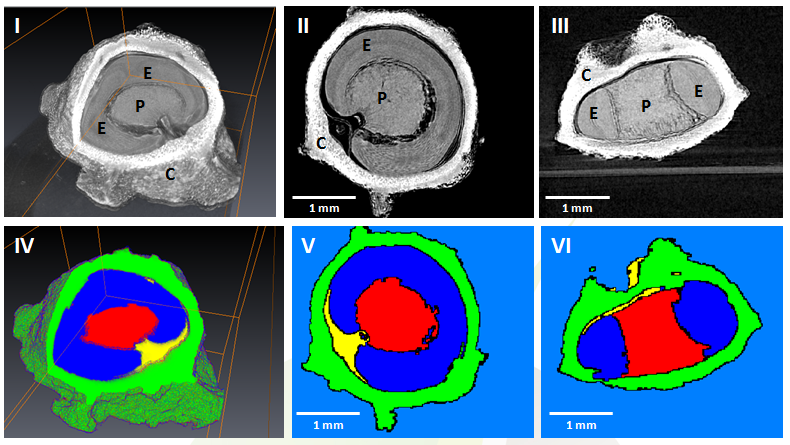
GEVES uses Avizo software to study and control plant seeds
At GEVES, Microtomography (micro-CT), which is a technique using X-rays to investigate internal anatomy and morphology of organisms without destruction, is applied to plant seed quality control and phenotyping. Several applications have been developed using micro-CT coupled with Avizo software development, such as for example in the Measurements of internal and external sugar beet seed structures for seed phenotyping
Read more
Ghassen Trigui, Laurence Le Corre, Dominique Honoré and Karima Boudehri-Giresse - 2D/3D Imaging - R&D team, GEVES
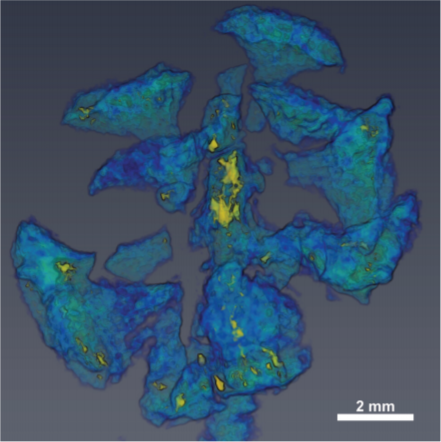
Computed tomography is an increasingly popular technique for the non-destructive study of fossils. Whilst the science of X-ray computed tomography (CT) has greatly matured since its first fossil applications in the early 1980s, the applications and limitations of neutron tomography (NT) remain relatively unexplored in palaeontology. These highest resolution neutron tomographic scans in palaeontology to date were conducted on a specimen of Austrosequoia novae-zeelandiae (Ettingshausen) Mays an... Read more
Chris Mays, Joseph J. Bevitt, and Jeffrey D. Stilwell
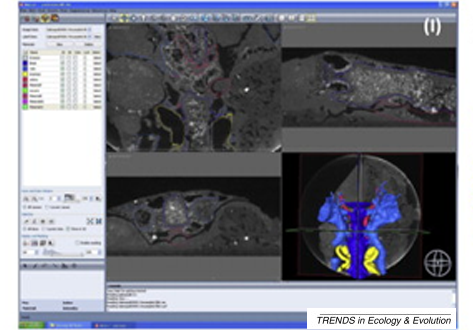
A virtual world of paleontology
Computer-aided visualization and analysis has revolutionized the study of fossils. Fossils can now be characterized in three dimensions and in unprecedented detail. The resulting digital reconstructions can be used in rigorous functional analyses. Hypotheses regarding the function of extinct organisms can therefore be tested.
Read more
Trends in Ecology & Evolution
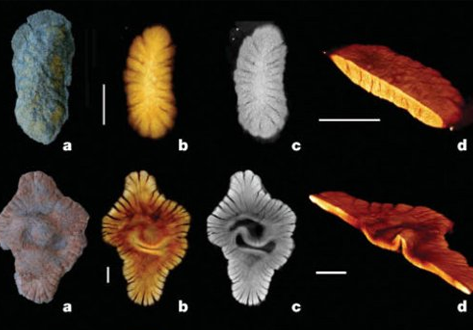
2 BILLION years old fossils appear to represent a first experiment in megascopic multicellularity
The Paleoproterozoic Era witnessed crucial steps in the evolution of Earth’s surface environments following the first appreciable rise of free atmospheric oxygen concentrations ∼2.3 to 2.1 Ga ago, and concomitant shallow ocean oxygenation. Combined microtomography, geochemistry, and sedimentary analysis suggest a biota fossilized during early diagenesis. The emergence of this biota follows a rise in atmospheric oxygen, which is consistent with the idea that surface oxygenation allowe... Read more
Abderrazak El Albani, Laboratoire HYDRASA, UMR 6269 CNRS-INSU, Université de Poitiers, France
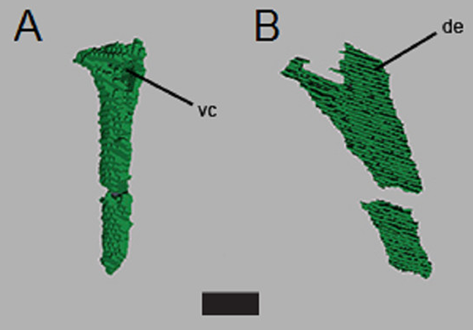
Aetosauria is a clade of heavily armored, quadrupedal omnivorous to herbivorous archosaurs known from the Late Triassic across what was the supercontinent of Pangea. Their abundance in many deposits relative to the paucity of other Triassic herbivores indicates that they were key components of Late Triassic ecosystems. However, their evolutionary relationships remain contentious due, in large part, to their extensive dermal armor, which often obstructs observation of internal skeletal anatomy... Read more
Devin K. Hoffman, Andrew B. Heckert, Lindsay E. Zanno
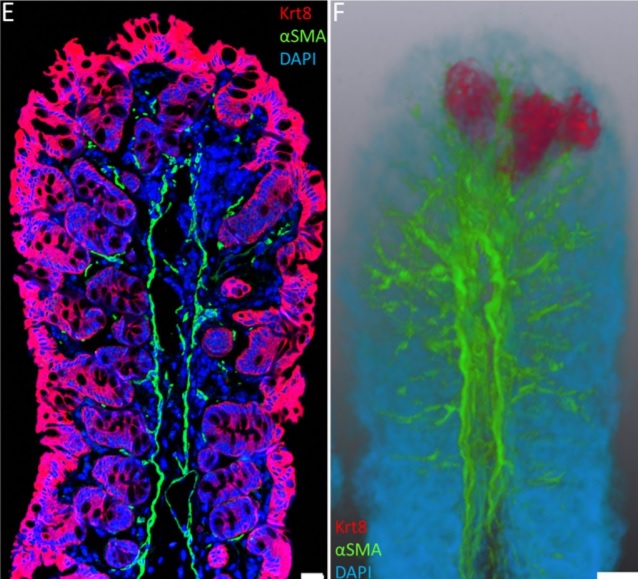
Immunofluorescence tomography is a high-resolution 3-D reconstruction method based on methacrylate embedding and serial-sectioning, where 2-D images of immuno-stained serial-sections are computationally aligned into image stacks, and the 3-D volume rendered. Butyl-Methyl Methacrylate (BMMA) plastic was adopted as it preserves excellent tissue morphology and can be de-plasticized easily using an organic solvent, which enables immuno-staining of serial-sections without antibody penetration issu... Read more
Parfitt, Geraint J

Modelling deformation and fracture in confectionery wafers
The aim of this research is to model the deformation and fracture behaviour of brittle wafers often used in chocolate confectionery products.
Three point bending and compression experiments were performed on beam and circular disc samples respectively to determine the ‘apparent’ stress-strain curves in bending and compression. The deformation of the wafer for both these testing types was observed in-situ within an SEM. The wafer is modelled analytically and numerically as a composi... Read more
Idris K. Mohammeda, Maria N. Charalambides , J. Gordon Williams , John Rasburn
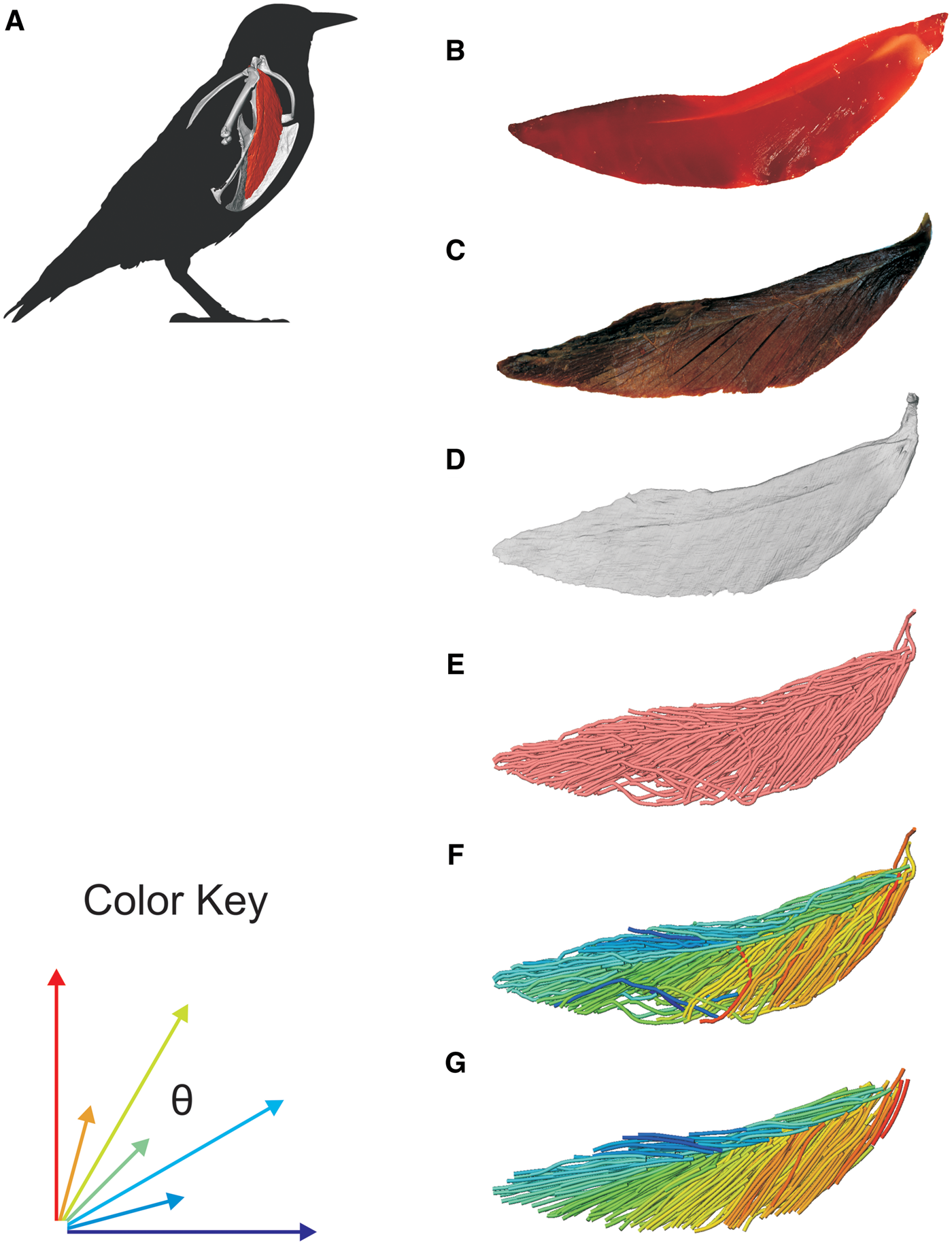
3D Muscle Architecture of the Pectoral Muscles of European Starling (Sturnus vulgaris)
Avian flight is achieved through a number of modifications to the body, including the pectoral girdle (…). Muscle architecture is a critical variable in determining the biomechanical function of the vertebrate musculoskeletal system; however, accurate three-dimensional (3D) understanding of muscle architecture has been historically difficult to acquire. Here, we present a musculoskeletal model of a European starling (Sturnus vulgaris) pectoral girdle generated from iodine contr... Read more
S.P. Sullivan, F.R. McGechie, K.M. Middleton, C.M. Holliday
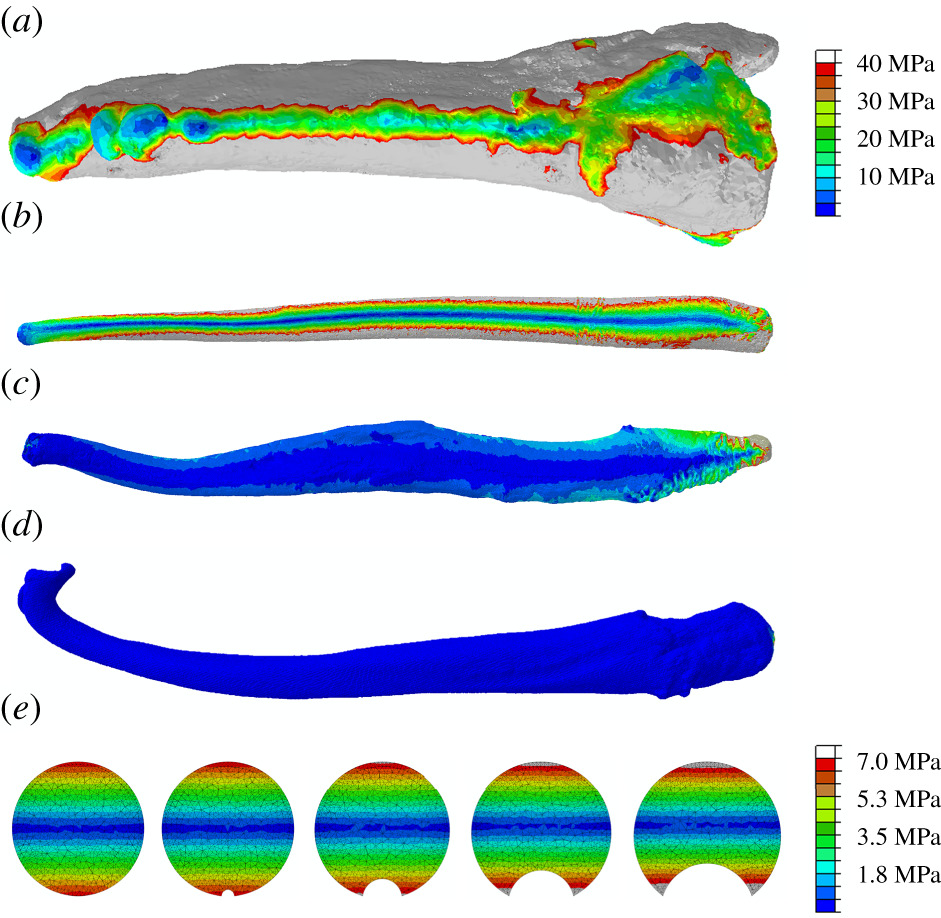
Testing hypotheses for the function of the carnivoran baculum using finite-element analysis
The baculum (os penis) is a mineralized bone within the glans of the mammalian penis and is one of the most morphologically diverse structures in the mammal skeleton. (…) For the first time, to our knowledge, we apply a computational simulation approach (finite-element analysis; FEA) to quantify the three-dimensional biomechanical performance of carnivoran bacula (n = 74) based upon high-resolution micro-computed tomography scans. (…) a highly significant negative relation... Read more
Charlotte A. Brassey, James D. Gardiner, and Andrew C. Kitchener
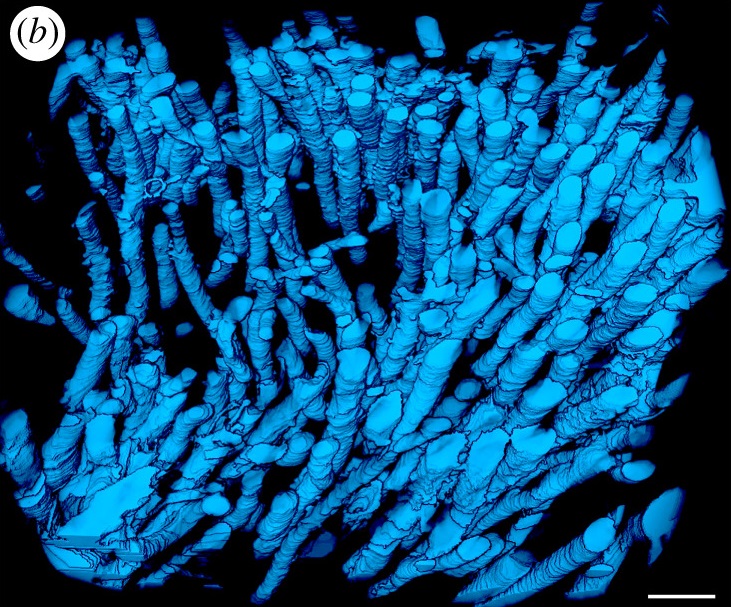
Microbial-tubeworm associations in a 440 million year old hydrothermal vent community
Microorganisms are the chief primary producers within present-day deep-sea hydrothermal vent ecosystems, and play a fundamental role in shaping the ecology of these environments. (…) The oldest known hydrothermal vent community that includes metazoans is preserved within the Ordovician to early Silurian Yaman Kasy massive sulfide deposit, Ural Mountains, Russia. (…) A re-examination of these fossils using a range of microscopy, chemical analysis and nano-tomography techniques re... Read more
Magdalena N. Georgieva , Crispin T. S. Little , Russell J. Bailey , Alexander D. Ball and Adrian G. Glover
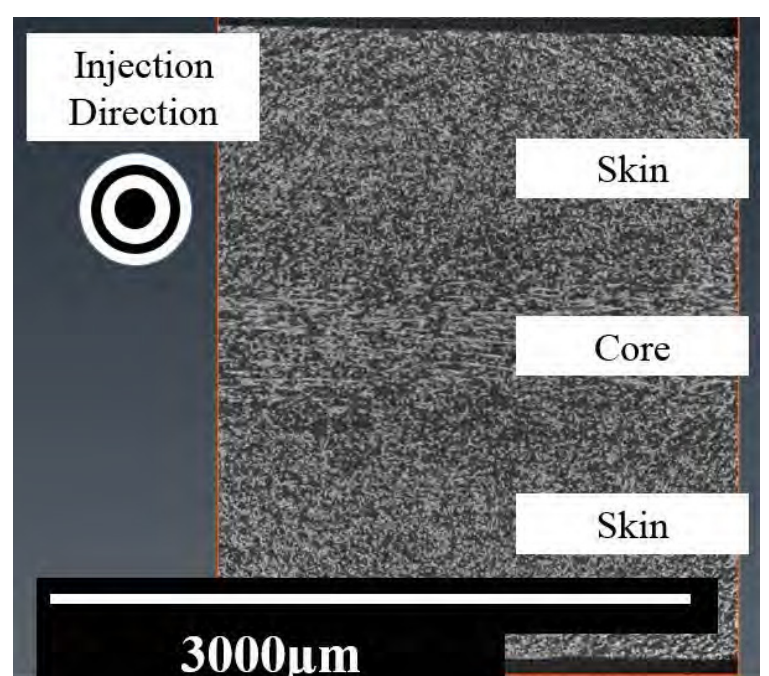
For many years, SFRPs (short fibre reinforced polyamides) have been used in the automotive industry as a means to reduce vehicle weight. However, their complex anisotropic and heterogeneous microstructure requires sophisticated material characterisation and simulation. This study aims at presenting the simulation strategy adopted by an automotive company address these challenges. The manufacturing process is first simulated and correlated with tomography analysis. Then, based on the numerical... Read more
Pablo Wilson, Peter Heyes
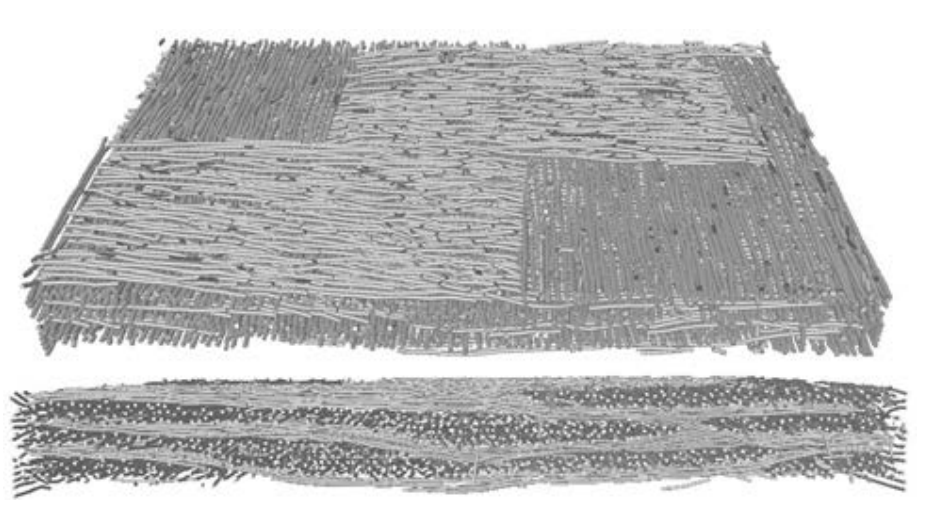
The paper proposes a new experimental methodology, based on ultrasonic measurements, that aims at evaluating the anisotropic damage in woven semi-crystalline polymer composites through new damage indicators. Due to their microstructure, woven composite materials are characterized by an anisotropic evolution of damage induced by different damage mechanisms occurring at the micro or mesoscopic scales. In this work, these damage modes in polyamide 6.6/6-woven glass fiber reinforced composites ha... Read more
Pascal Pomarède, Fodil Meraghni, Laurent Peltier, Stéphane Delalande, Nico F. Declercq
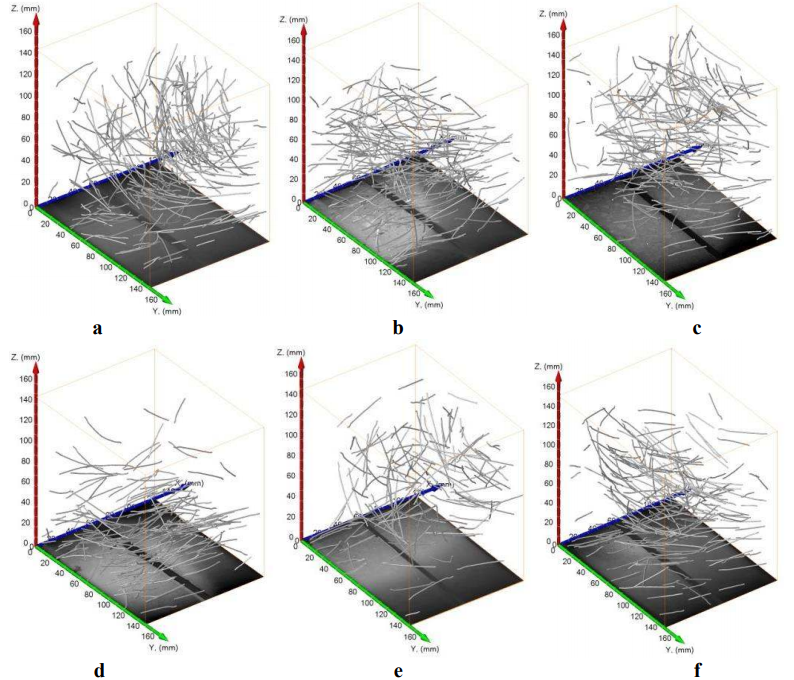
In this paper a study concerning an automatic determination of distribution of steel fibres in self-compacting concrete (SCC) is presented. The determination of fibre distribution is required to assess any relationship between those features and casting methods of concrete elements. Concrete beams with steel fibres of various types and casting methods were examined. Involved methods were computed tomography imaging followed by image analysis. After image analysis a label map consisting of all... Read more
T. Ponikiewski, J. Golaszewski, M. Rudzki, M. Bugdol
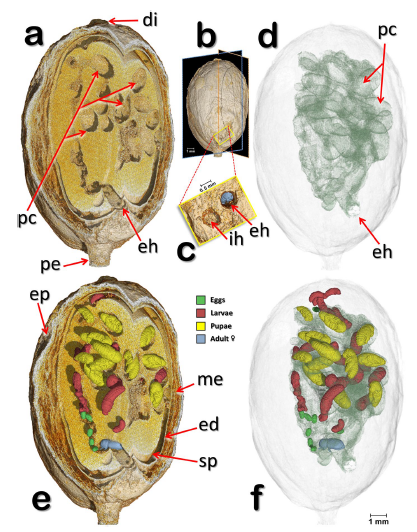
The coffee berry borer is the most devastating insect pest of coffee throughout the world. The insect spends most of its life cycle inside the coffee berry, which makes it quite difficult to observe its behaviour. Micro-computed tomography (micro-CT) was used to observe all developmental stages of the coffee berry borer inside coffee berries (Coffea canephora). An interesting oviposition pattern involving a sequential placement of eggs starting in the periphery of the seed and moving inwards ... Read more
Ignacio Alba-Alejandre, Javier Alba-Tercedor, Fernando E. Vega
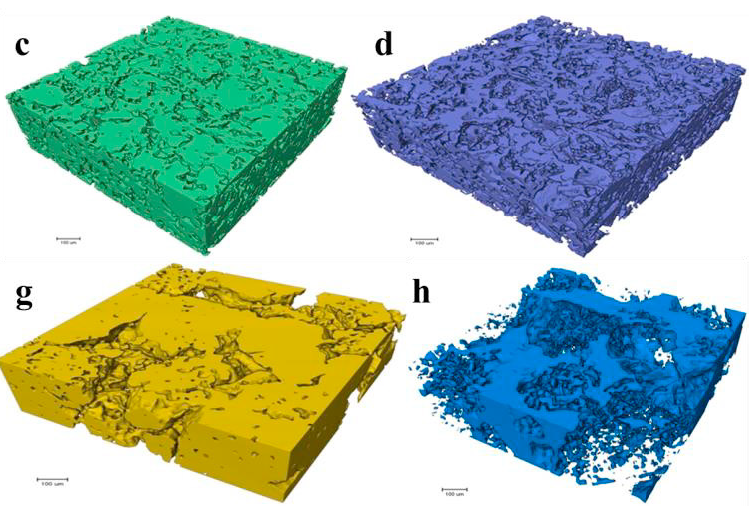
The porous transport layer (PTL) is a vital component of the polymer electrolyte membrane water electrolyser (PEMWE) as it is both a conduit for current distribution and mass transport. This study aims to examine the influence of the microstructure of the PTL on the performance of a PEMWE by the combination of ex-situ and in-situ techniques. Two PTLs with distinctly different mean pore diameter were characterized to determine key properties such as surface morphology, porosity, pore size dist... Read more
Jude O Majasan, Francesco Iacoviello, Paul R Shearing, Dan JL Brett
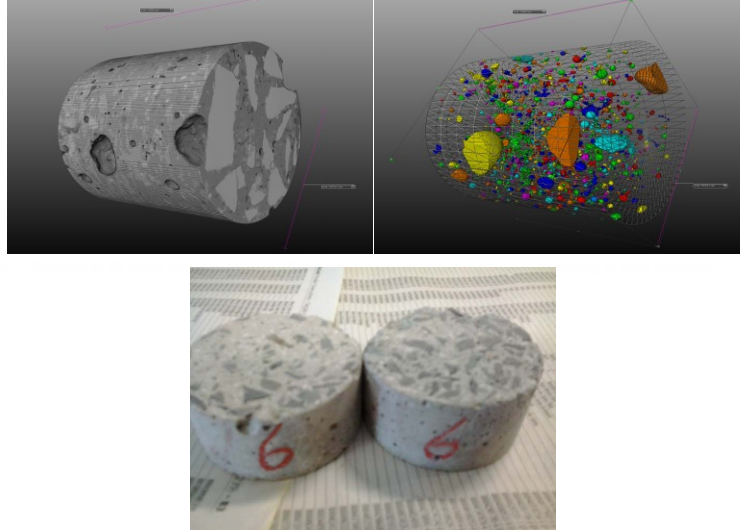
The thermal conductivity values of ordinary concrete can be adjusted to those prescribed in constructions by entraining air bubbles to reduce the density of concrete in order to achieve good thermal insulation. This paper concerns the analysis of air bubble distribution in concrete obtained by micro X-ray µCT (computed tomography) and correlates it with its thermal conductivity (k). (…) The results show that air-entrainment leads to viable use of this material as sealer to achieve good... Read more
A. P. Peruzzi, J. A. Rossignolo and H. Kahn
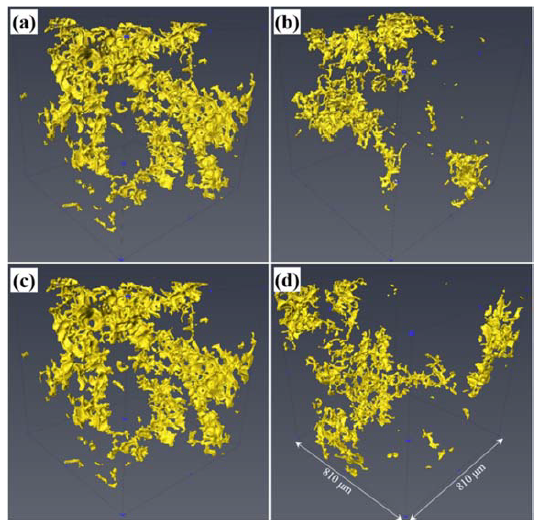
The effect of ultrasonic melting processing on three-dimensional architecture of intermetallic phases and pores in two multicomponent cast Al-5.0Cu 0.6Mn-0.5 Fe alloys is characterized using conventional microscopy and synchrotron X-ray microtomography. (…) The results show that ultrasonic melt processing (USP) significantly reduce the volume fraction, grain size, interconnectivity, and equivalent diameter of the intermetallic phases in both alloys. The volume fraction of pores in both ... Read more
Yuliang Zhao, Dongfu Song, Bo Lin, Chun Zhang, Donghai Zheng, Zhi Wang, Weiwen Zhang
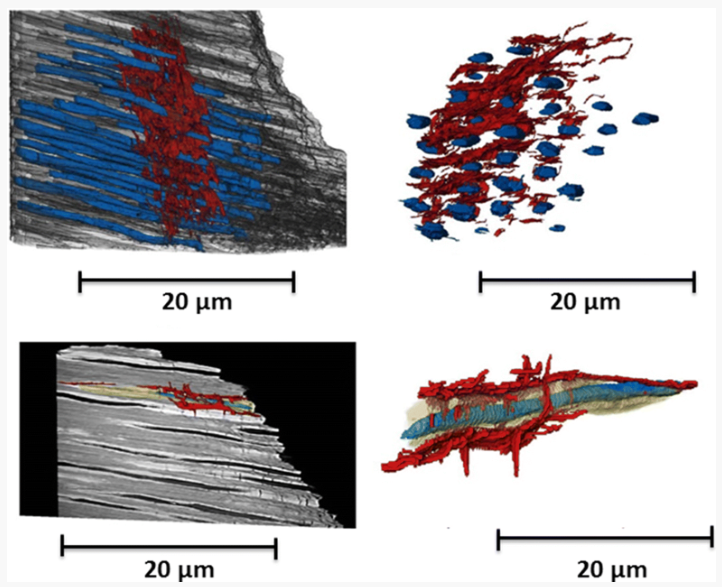
Micron-scale crack propagation in laser-irradiated enamel and dentine studied with nano-CT
The aim of this study was to see the effect of Er:YAG laser irradiation in dentine and compare this with its effect in enamel. The mechanism of crack propagation in dentine was emphasised and its clinical implications were discussed. A possible mechanism is that laser radiation is transmitted down the dentinal tubules causing micro-cracks to form in the dentinal tubule walls that tend to be limited to this region. Crack might be a source of fracture as it represents a weak point and subsequen... Read more
Abtesam Aljdaimi, Hugh Devlin, Mark Dickinson, Timothy Burnett, Thomas J. A. Slater
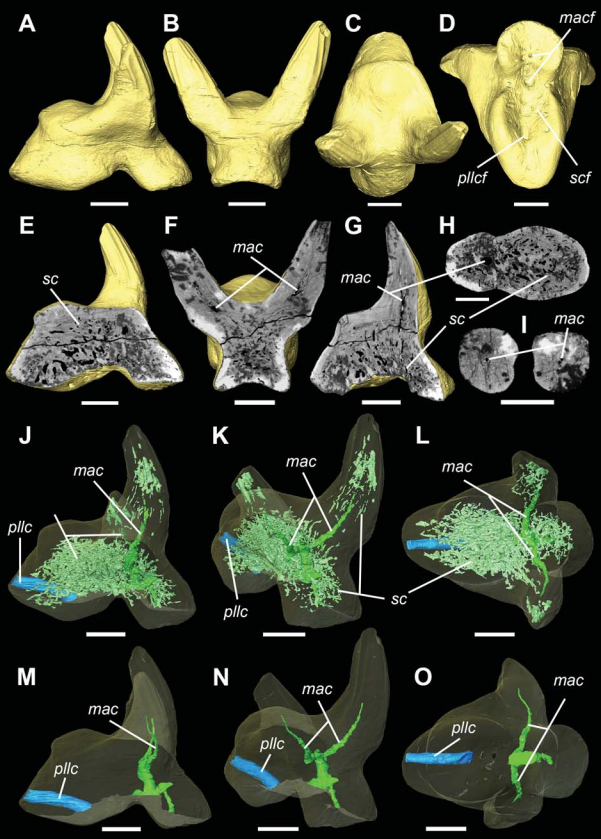
Vascular structure of the earliest shark teeth
Here we use synchrotron tomography to characterise dental vasculature in the oldest known tooth-bearing sharks, Leonodus carlsi Mader, 1986 and Celtiberina maderi Wang, 1993. Three dimensional reconstruction of the vascular system and microstructure of both taxa revealed a complex and dense network of canals, including horizontal, ascending and secondary bifurcated canals, as well as histological features consistent with an osteodont histotype. However, L. carlsi and C. maderi also exhibit si... Read more
Carlos Martinez-Perez, Alba Martin-Lazaro, Humberto G Ferron, Martina Kirstein, Philip C.J. Donoghue, Hector Botella
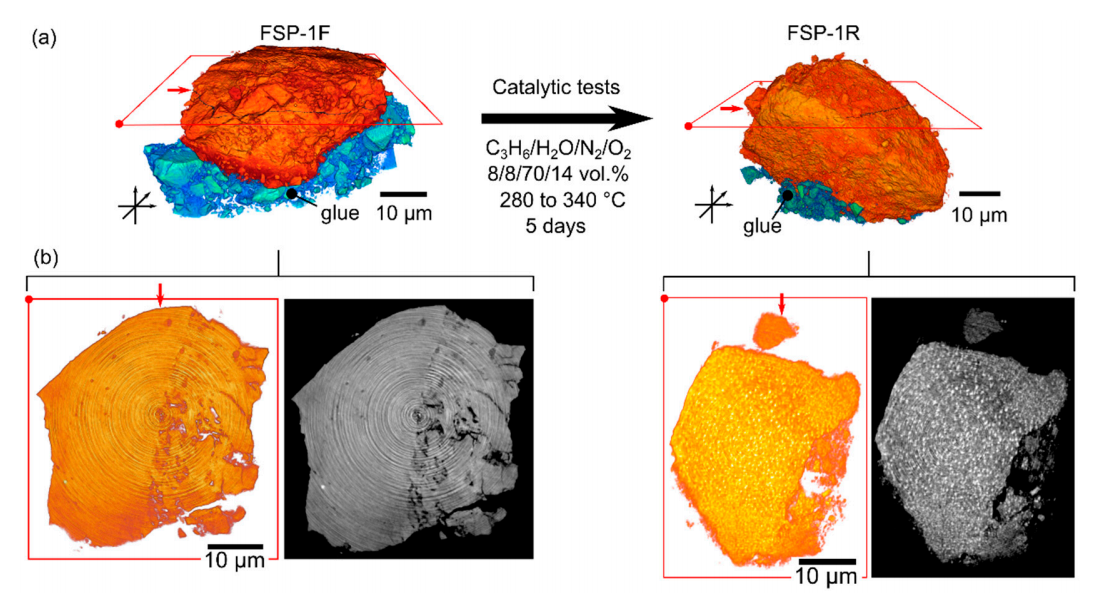
Structural Evolution of Highly Active Multicomponent Catalysts for Selective Propylene Oxidation
Multicomponent Bi-Mo-Fe-Co oxide catalysts prepared via flame spray pyrolysis were tested for selective propylene oxidation, showing high conversion (>70%) and selectivity (>85%) for acrolein and acrylic acid at temperatures of 330 ◦C. During extended time-on-stream tests (5–7 days), the catalysts retained high activity while undergoing diverse structural changes. This was evident on: (a) the atomic scale, using powder X-ray diffraction, Raman spectroscopy, X-ray absorption spectros... Read more
Paul Sprenger, Thomas L Sheppard, Jussi-Petteri Suuronen, Abhijeet Gaur, Federico Benzi and Jan-Dierk Grunwaldt
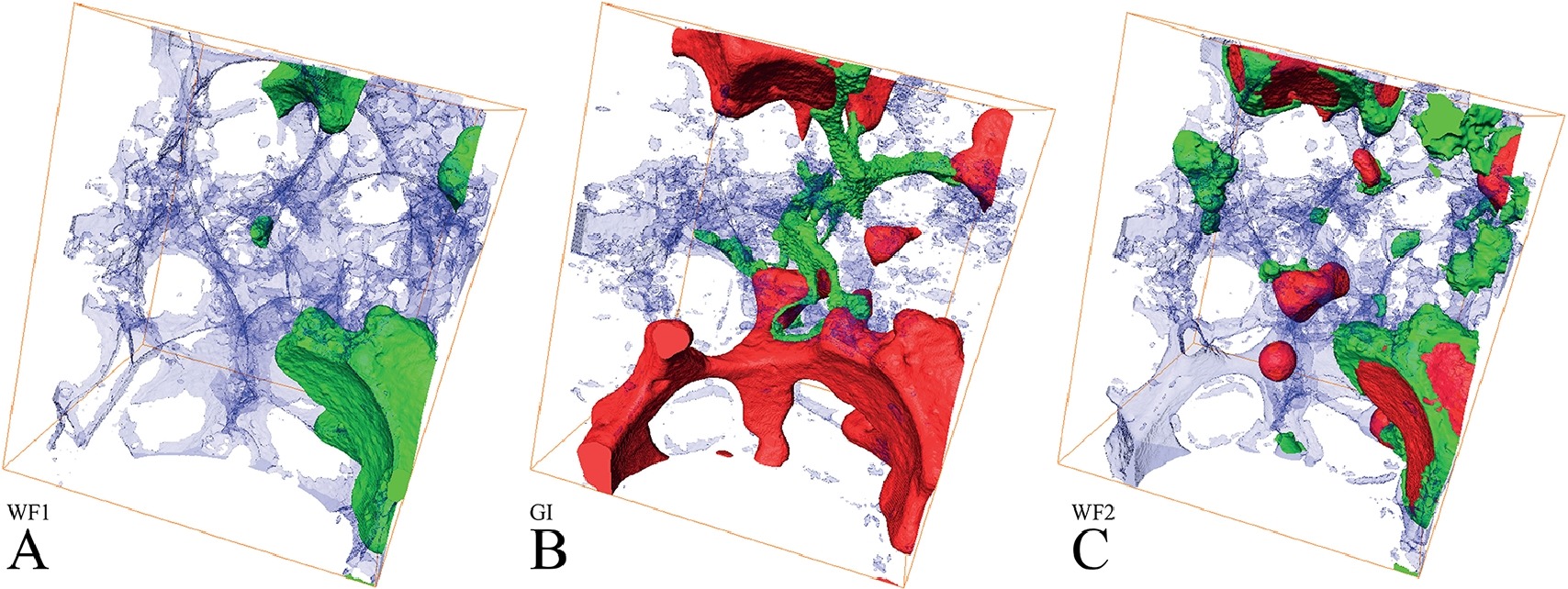
X-ray micro-tomography is used to image the pore-scale configurations of fluid in a rock saturated with three phases – brine, oil and gas – mimicking a subsurface reservoir, at high pressure and temperature. We determine pore occupancy during a displacement sequence that involves waterflooding, gas injection and water re-injection. In the water-wet sample considered, brine occupied the smallest pores, gas the biggest, while oil occupied pores of intermediate size and is displaced ... Read more
Alessio Scanziani, Kamaljit Singh, Tom Bultreys, Branko Bijeljic, Martin J. Blunt